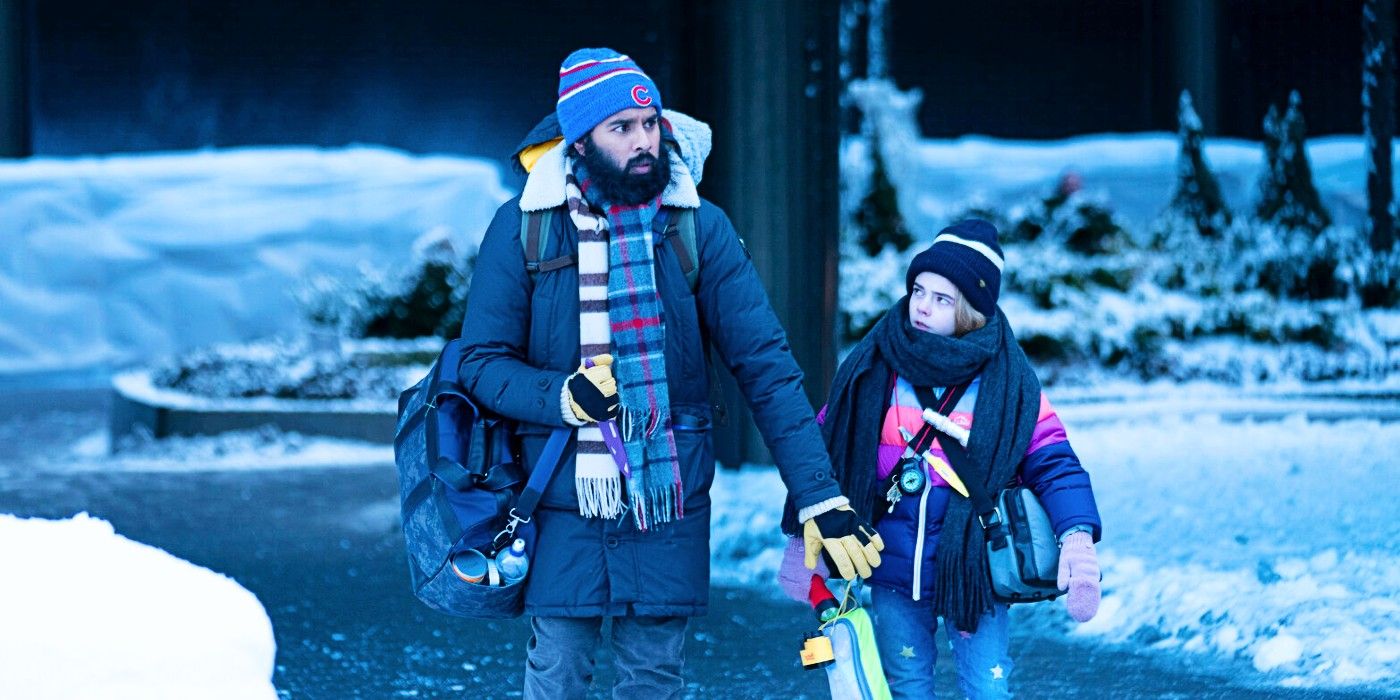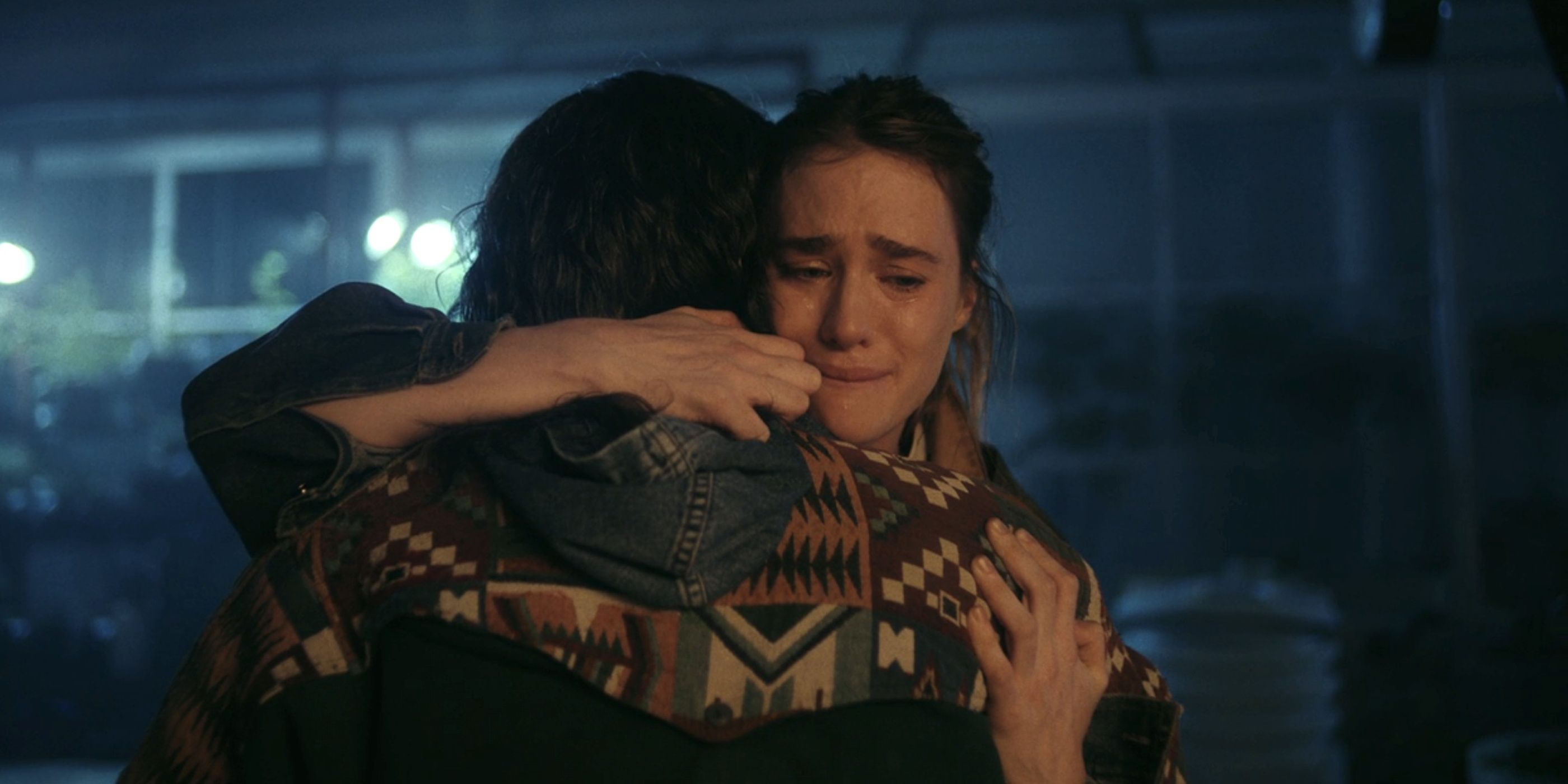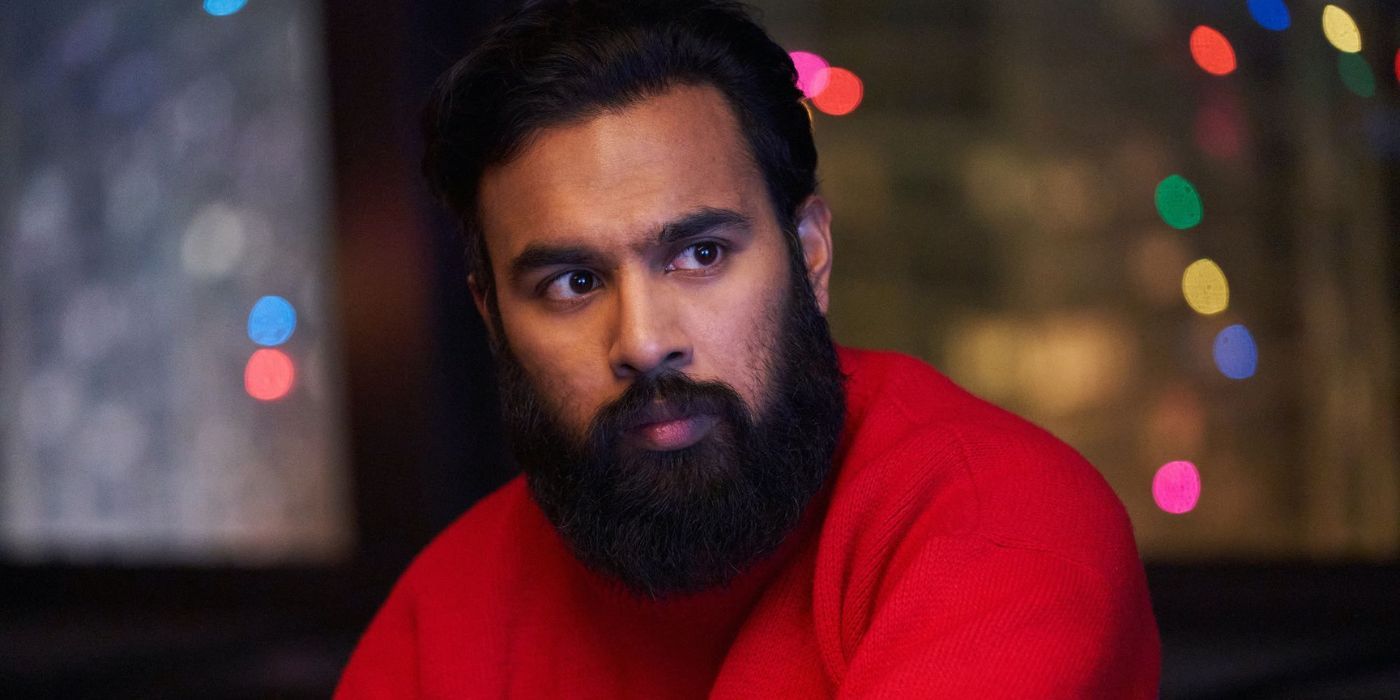Himesh Patel stars in Station Eleven as Jeevan, a man who is unwittingly swept up in a global pandemic with a child he had just met by his side. Based on Emily St. John Mandel's book of the same name, Station Eleven earned critical acclaim when it aired on HBO Max in December 2021 and January 2022. Spanning decades, the story follows Jeevan's journey protecting Kirsten, played as a child by Matilda Lawler and as an adult by Mackenzie Davis.
Kirsten and Jeevan are the anchors of a story that explores ideas of hope in the fact of total devastation, what it means to create, and how humans adapt in the most dire of circumstances. Patel's work in Station Eleven earned him an Emmy nomination for Outstanding Lead Actor in a Limited Series or Movie. Hiro Murai was also nominated for Outstanding Director (for the episode "Wheel of Fire), while Patrick Somerville earned a nom for Outstanding Writing (for the episode "Unbroken Circle).
Screen Rant sat down with Patel to discuss Station Eleven, including filming the show while a very real pandemic raged on, the cathartic nature of the series, and whether he'd be interested in exploring more of Jeevan's story.
Screen Rant: The reception of Station Eleven has been amazing. What has that been like?
Himesh Patel: It's been really heartening, and it means a lot to me, but also to everyone who worked on the show. From the crew that we worked with in Chicago, in January and February of 2020, to the crew that we worked with in Toronto when we put the show back up a year later. There are a lot of people who've worked very hard on the show for a very long time. The most important thing, of course, is that we found an audience and that the story meant so much to so many people. And then, of course, to have the recognition from the TV Academy is just a really wonderful thing to have now as well.
The book was so acclaimed and now the show is as well. Were you able to read the book before diving into the show?
Himesh Patel: When it came my way, it was just an audition. They were kind enough to send me the pilot episode, which heavily features Jeevan. And so I read that and was blown away by it and I knew that I was gonna be flying to LA to audition. So in the meantime, I bought the book, and I read it pretty much within 24 hours. It certainly felt that way. Anyway, I couldn't put it down. And so that gave me some context and an idea of what the story was. And then I auditioned, but I'd also had a conversation with Patrick [Somerville] and Hiro [Murai] beforehand, and then I continued the conversation with them at the audition as well. They sort of gave me an idea of their plan for the show.
One of my first questions was [about] Jeevan - he is very much in the beginning of the book, but then he sort of disappears. So what's their plan with the character? They had ideas of what they wanted to do with him, and that sort of developed over time and I think ended in a really great place. I got to do some really great stuff. The books are a wonderful story. And I really think that the story that we tell with the series sort of complements that really, rather than being a sort of carbon copy.
There's sort of this meta-textual layer to Station Eleven with the traveling theater troupe finding solace and creating art. The airport group collecting these artifacts. Was it easy to relate to that, considering, you and the cast and crew came back together under somewhat similar circumstances?
Himesh Patel: I think it was probably less immediately gratifying to us as I feel it is for the traveling symphony. They really are living in a new world that is, more or less sort and so them performing is very much a thing of joy. And as much for me, doing my job is joy, making the bulk of the show as we did during the pandemic wasn't easy. It was difficult in terms of logistics, in terms of how it affected all of our personal lives, and just how weird it was to get used to shooting this new way where you're sort of surrounded by a crew, most of whom you don't know what they look like because they're wearing masks. So there was sort of an unsettling and strange nature to shooting it despite [the fact that] we're all doing what we love and to have a job and be employed in that time was a huge privilege. But it was also a very strange time to be working as well.
Were you worried at all about how the show would be received?
Himesh Patel: We had, obviously, considered that, and I certainly had nerves about it. And, of course, around the time that the show actually came out, we had this huge [wave of] rising cases. I think ultimately, I knew that there would be an audience for it because of fans of the book, or fans of Hiro's work, and fans of Patrick's work and that there would be an audience there. I had confidence in the quality of the show. But I think I was prepared to be patient with how it would be received because you have to be understanding, especially [with] that first episode. It's such an expansive story and we flip between timelines and we're telling, on one hand, a story that's very much about hope. And I think that the heart of the show very much is about hope. But I can understand people sort of taking that first episode and going, "This is too much for me right now." I had to be patient with that. I didn't expect it to suddenly be the hottest show in the world, and everyone go flooding to watch it. There had to be a certain sense that it would be not necessarily so easy to digest. But ultimately, I was thrilled with the response to it and it was better than I could have ever expected.
You mentioned that thread of hope. The first episode is sort of bleak, but then as the show opens up, there is that idea of hope and continuing on in the face of everything that's happened to these characters, and then building a new world. That was what made it almost more worthwhile than what we see with typical post-apocalyptic tales.
Himesh Patel: Yeah, I think Patrick was very keen to make sure that we were standing out in that way, and that we weren't going to tell a bleak story. Ultimately, it is about hope, and it's about how art can save lives and bring people together, and how essential it is. Even when everything else is gone, we'll find ways to do that.
You're also working with two actresses - in this case, Matilda and Mackenzie. How did you build that relationship with both of them? Because you spent more time with Matilda, but then your reunion with Kirsten at the end of the show is so emotional.
Himesh Patel: In terms of Matilda, she's just such a special talent. I certainly felt like I shared this nomination with her, because we had to work together to build that foundation of that relationship. It was the first thing that we shot on the show, and I remember, I did a camera test with her and she was just the standout by far. And then we shot the pilot together and she was just so so attuned to everything, and had such a wonderful instinct, and is so curious about everything. She's really committed to her craft and it's amazing. So that was a wonderful foundation to have.
In terms of Mackenzie, it was nice to build a friendship with her. Briefly, before we worked together, we met up in London during lockdown. We went for a sort of outdoor walk as we could do back then. And so we touched base before we worked together. That was nice. And then it was quite good that the first thing we shot when we came back after lockdown was episode seven. And so Mackenzie was sort of there while we were all doing our scenes. She was there; very much part of the scenes, but in a sort of observational way. We kind of all hung out together and got to know each other then, and so, by the time we got to doing our bits for episode two, we sort of had a friendship there. That was really helpful in terms of being able to discuss how we wanted to approach those two things. And I felt like there was a sort of trust that developed between us in a really interesting way, despite having not worked together to that point.
I think, ultimately, what I'm saying is that the two actresses that we had playing Kirsten were both incredibly special people and I'm lucky to have worked with them in very different ways.
Was there any particular scene in the show, either physically or emotionally, that was kind of the hardest for you to film and to process?
Himesh Patel: There's that scene at the end of episode 7 where the intruder arrives in the apartment, and it all just sort of falls apart pretty quickly. I had to go to sort of an emotional place and track an emotional journey through a relatively short period of time there that I hadn't really ever done before. I was nervous about it and I remember I reached out to our director on that episode, Lucy Tcherniak, and I said, "I'm a bit nervous, and just bear with me if I sort of struggle a bit with it," and she was really wonderfully understanding of that and generous with how we were going to get through it.
But I had to dig deep there and sort of take myself to an emotional place that I hadn't really had to do before. I'm so thankful [for] that really because that's ultimately what you want to do, what I certainly want to do as an actor. Be challenged and step up to the plate and figure out what my limits are. I'm not really interested in being too comfortable in doing anything. I want to be tested. When you're gifted with a role like this, it's a leading role and you want to feel that you're working hard for it.
I think the ending of the show kind of leaves things on an open-ended note and, in this day, miniseries are never really miniseries. Would you be willing to explore Jeevan's story more if given the opportunity?
Himesh Patel: I know that Patrick's working on adapting more of Emily's work, so that would be the only thing that would attract me to doing it again, Patrick coming to me and saying, "Look, I've got an idea." And if he's got an idea, I will listen to him all day. But I'm torn at the moment, really, between having had this kind of perfect arc of a character - it's a wonderful arc and I really loved going on a journey like that. And it's always one of those where you go, "I could continue this." But will it be one step too far? Or it could be something wonderful. So it really ultimately depends on what story we'd be turning with it really.
Station Eleven Synopsis
A post apocalyptic saga spanning multiple timelines, telling the stories of survivors of a devastating flu as they attempt to rebuild and reimagine the world anew while holding on to the best of what's been lost.
Station Eleven is currently available to stream on HBO Max.



